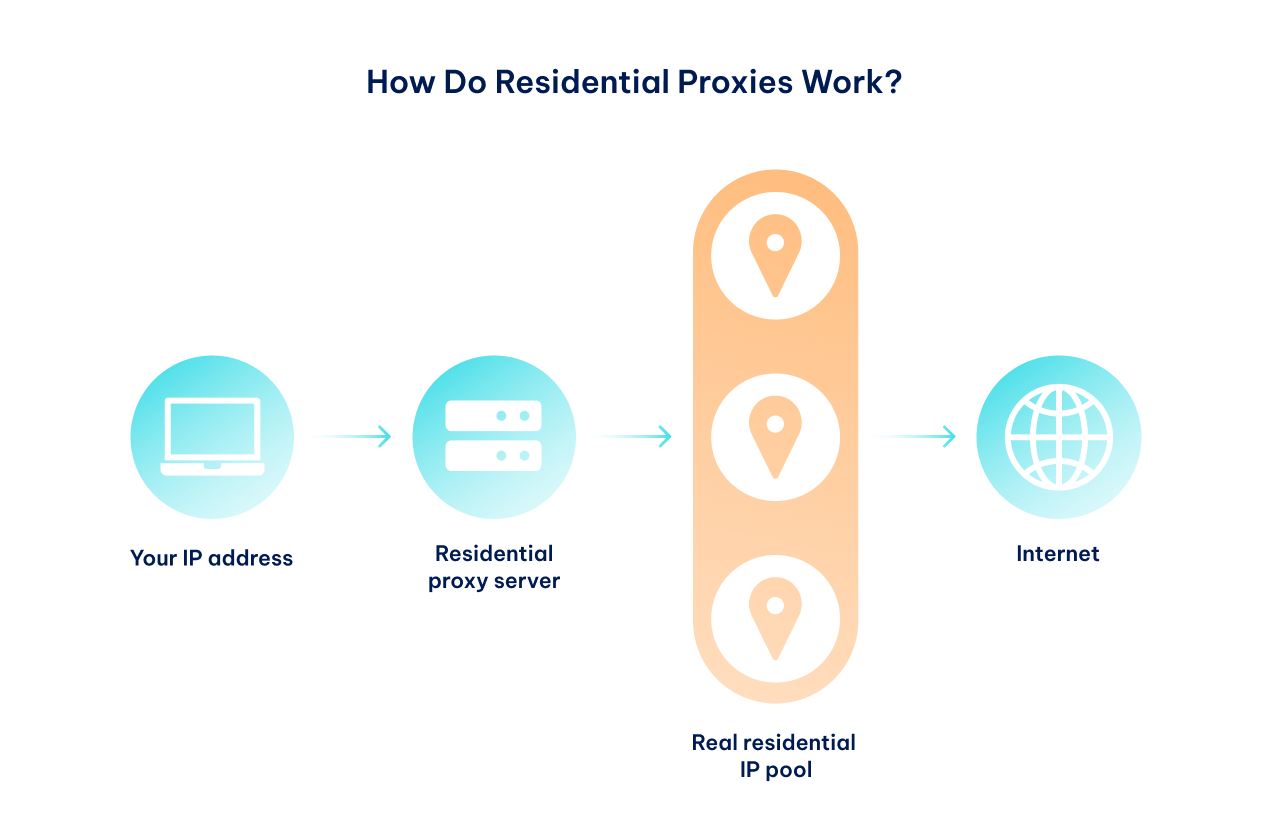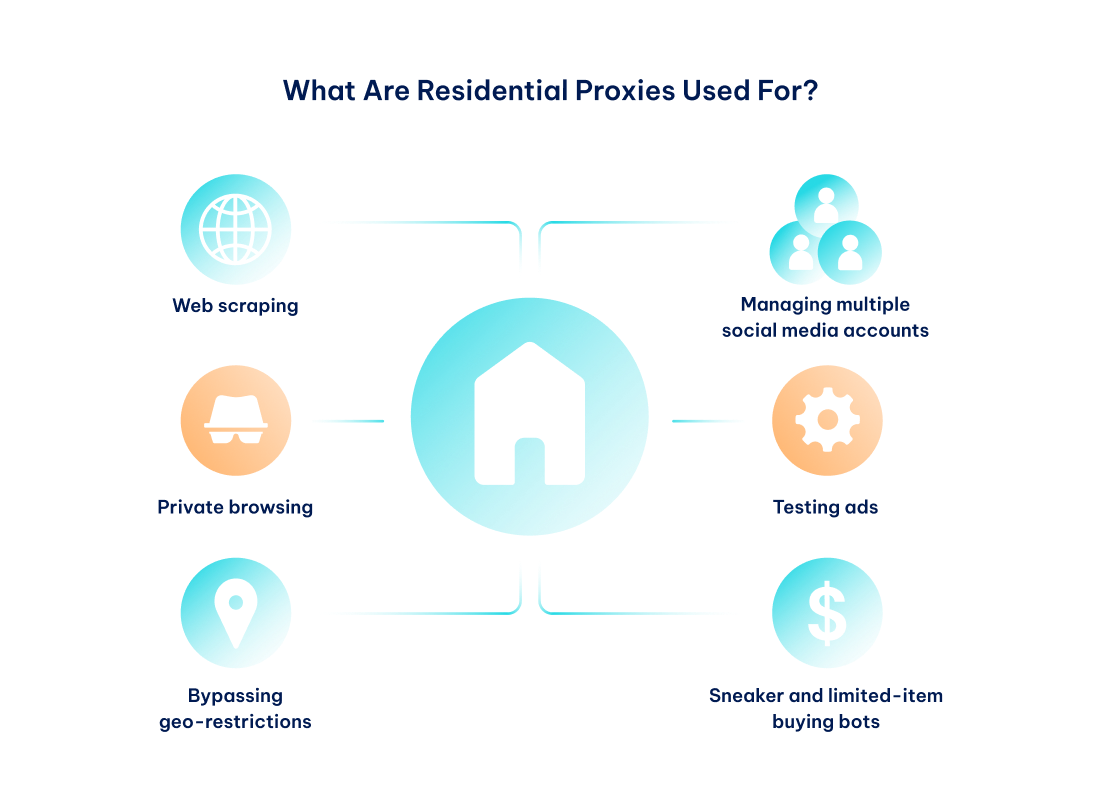What Is a Residential Proxy Server?


Simona Lamsodyte
In This Article
Residential proxies are household devices that act as internet request relays from one machine to another. Device owners voluntarily convert their phones, computers, and other equipment into residential proxies by installing internet sharing or similar apps.
While the internet is being shared, residential proxies only act as a relay, standing between the source and destination servers. It takes the connection request from the source and forwards it to the destination in its own name, using the residential IP address that’s assigned to the device. No other modifications or actions can or are being made.
How Do Residential Proxies Work and What Are They Used For?
When a user installs an internet sharing application, the device will be able to act as a residential proxy. While the terms of service differ, most such providers enable the device to become a proxy only when the user isn’t actively using it.
Here’s more about how it works:
- Gets real residential IP addresses. Residential proxies use IP addresses given to real people by ISPs. These IPs belong to real people in physical locations. When you connect through one, websites think you’re just another person at home using the internet.
- Masks your original IP . These proxies hide your true IP address. Instead of showing your location or device, it shows the IP of the house that the proxy uses. It helps you stay private online.
- Routes traffic through a real device. Your connection goes through a real device somewhere in the world. It might be a phone or a computer in someone’s house. A residential proxy makes your web activity look natural without imposing anyone’s privacy, since they’re getting paid for sharing their network connection.

These applications are usually owned by a proxy provider or by an independent entity. If it’s owned by an independent company, they usually monetize their residential proxy network pool by selling access to it to other businesses.
At the final stage of the transaction, businesses that need residential proxies purchase access to the pool of IP addresses from providers. They then use residential proxies for various use cases such as travel fare aggregation or web scraping .
What Are Residential Proxies Used For
Residential proxies are vital for use cases that require frequent IP changing to avoid issues. For example, a device in New York, USA, will be shown information for that location even if the original source of the connection is from Europe.
Here are some use cases where residential proxies are most beneficial:
- Web scraping . Many websites block users who send too many requests, especially during a short period of time. Residential proxies make web scraping look like normal browsing from different people. For example, if you’re gathering price data from hundreds of product pages, these proxies help avoid CAPTCHAs or bans.
- Bypassing geo-restrictions . Some sites only show content in certain countries. With residential proxies, you can pick an IP from that country and unlock the content. It’s useful for accessing region-locked websites that’s blocked in your area.
- Testing ads . Companies use residential proxies to check how their ads appear in different cities or countries. They want to see if the right people are seeing the right ads. It helps marketers tweak ads for better results.
- Managing multiple social media accounts . Platforms like Instagram or Facebook often flag accounts that log in from the same IP. Residential proxies help keep each account looking like it’s from a different person. This is extremely useful for agencies or businesses that handle many profiles.
- Sneaker and limited-item buying bots . People sometimes use residential proxies to buy limited-edition items quickly. Bots with these proxies avoid bans and buy from stores like Nike or Adidas before items sell out.
- Private browsing . Residential proxies help people browse the web without giving away their real identity. Your IP stays hidden, so websites can’t track you that easily. It’s not full invisibility, but it makes it much harder for sites to follow what you do online.
In some sense, residential proxies (and most other types) are similar to VPNs, however, the latter are used by consumers while the former are more frequently used by businesses.

Additionally, there are some use cases where specific locations are less important such as brand protection. These businesses use residential proxies to constantly monitor the web against copyright infringement and similar activities.
Types of Residential Proxies
As the definition of residential proxies only includes the fact that it can relay requests and is a household device (as opposed to a business-owned server, for example), there are many different types. Here are some common categories of residential proxies:
Rotating Residential Proxies
Rotating proxies are residential proxy services that automatically switch IP addresses upon each request or after a set amount of time or actions. Users usually connect to an endpoint that performs all of these actions according to their settings – rotating residential proxies are closer to a service than a different proxy type.
Rotating residential proxies are most frequently used in cases where maintaining the same identity is not important and ban rates are high. Public data web scraping, for example, is a common use case for these residential proxies.
Static Residential Proxies
Completely the opposite of rotating residential proxies as they maintain the same IP address for a set duration. Static residential proxies are harder to acquire as companies usually have no control over the user’s device. Static residential proxies, therefore, may be sourced from an internet service provider or other companies.
Static residential proxies are often used where maintaining a single identity is important. Managing multiple users on social media accounts is a classic use case for static residential proxies.
Mobile Proxies
These are mobile residential proxies sourced from mobile devices. Mobile proxies are usually even less prone to getting banned and are considered more legitimate.
They may also be used for data gathering whenever a mobile device may be shown different information. Other than the device, they are functionally no different from regular residential proxies.
You simply get mobile IP addresses from mobile residential proxies which you can use to access geo-restricted content, manage multiple accounts, or anything else that you may need.
Dedicated Residential Proxies
Dedicated residential proxies where the IP addresses are assigned to a single account. No other users from the same residential proxy provider can get access to the same IPs. Otherwise these proxies are technologically no different from regular residential proxies.
Dedicated residential proxies are widely used for most use cases where regular residential proxies are employed. Their counterparts, shared residential proxies, are significantly cheaper, however, they have some major disadvantages.
If people can share the same residential proxy IP addresses for various purposes, it may increase block rates. As such, dedicated residential proxies are often the type of choice if cost savings are not the primary goal.
ISP Proxies
ISP (or Internet Service Provider) proxies are a middle ground between datacenter proxies and residential proxies. An internet service provider can assign a residential IP address to a data center server they own.
ISP proxies have the speed of a datacenter proxy and the legitimacy of a residential proxy, making them extremely valuable. Internet service providers, however, don’t usually provide a lot of ISP proxies to a single company so pools can be relatively small. They’re also often the most expensive proxy server type, so they’re reserved for highly sensitive use cases.
These types of residential proxies are not all mutually exclusive. Sometimes residential proxies may be combined as some are technologically different while others simply offer a service. For example, dedicated residential proxies are just a service offered by a provider – functionally they’re no different from regular proxy servers.
Residential Proxies vs Datacenter Proxies vs VPNs
One of the primary counterparts for residential proxies are datacenter proxies. These do not have residential IP addresses, making them easier to detect. However, datacenter proxies are created in business-owned servers in bulk, making them cheaper and faster.
| Proxy type | Residential proxies | Datacenter proxies | Premium VPNs |
|---|---|---|---|
| Price | Higher | Lower | Lowest |
| Legitimacy | Higher | Lower | High |
| Speed | Lower | Higher | Medium |
| Reliability | Lower | Higher | High |
| Pool size | Higher | Lower | 1 shared IP per server |
These differences show that residential and datacenter proxies are used for different use cases. Just like VPNs.
Residential proxies are used where ban and detection rates are high such as SEO monitoring and web scraping.
Datacenter proxies are more useful where speed and efficiency are more important such as website change monitoring or email protection.
A VPN network is best for quick access to geo-restricted content, security on public networks, and anonymity. They are intended for regular users who don’t need advanced functionality such as integrations with code, IP rotation, and other features.
As a result, if you’re going to scrape websites, a VPN won’t be enough for you. But if your goal is to watch a TV show on Netflix that’s not available in your country, you don’t need to get a residential proxy, as a reliable VPN is perfect for that.
How to Choose the Best Residential Proxy Provider?
Picking the right provider matters a lot. A bad one can slow you down, compromise your data-related ethics, get you blocked, or simply waste your money. Here are some things you should look for:
1. Large and clean IP pool. Choose a provider that has a lot of residential IPs in many locations. The more clean residential IPs they offer, the better your chances of staying undetected.
2. Good speed and uptime. Static and rotating proxies should be fast and stable. Look for providers that promise a high uptime (99% or more) and have servers that don’t lag or drop.
3. Location coverage. If you need residential IPs from specific countries or cities, make sure the provider offers those. The more regions they cover, the more flexible your setup can be and the more geo-restricted content you can access.
4. IP rotation and session control. The best providers let you choose between rotating residential proxies or sticky sessions. This matters when web scraping or logging into accounts.
5. Clear bandwidth rules . Some proxy plans limit how much data you can use. Know if your plan is pay-per-GB or unlimited.
6. Customer support and documentation . A good provider offers fast support and clear guides to help you get started. Look for live chat, account managers, tutorials, and more.
7. Pricing that fits your needs. Don’t go for the cheapest one just to save money. Check if the features match your needs. If you need SEO monitoring, choose a provider that focuses on that.
One of those that meet all these requirements above is IPRoyal. If you’re interested in high-quality proxies, check out our pricing and our features.
Are Residential Proxies Legal?
Residential proxies work by providing IP addresses to a third party. As such, they simply route internet traffic, making them no different, in a legal sense, from VPNs.
As with any tool, however, proxy servers may be used for various purposes, some of which may be illegal. Therefore, while proxy servers are themselves perfectly legal, you should take care that the way you’re planning to use them is legal.
Finally, there’s no legislation surrounding the acquisition of residential proxies (assuming no hacking is taking place). There are, however, ethical considerations for the acquisition of IP addresses – users should be consenting and rewarded for sharing their devices.
Not all residential proxy network providers acquire their IP addresses from transparent companies. While it doesn’t directly affect you, the acquisition of proxy servers should be transparent.
Conclusion
Residential proxies are household devices with IP addresses that are capable of acting as relays for other devices. In simple terms, they take a request from a source and forward it to the destination server.
Having localized IP addresses allow residential proxies to mask the source of the request. As such, the perceived location of the source is changed, making residential proxies extremely useful when accessing geographically-based information.
Additionally, some use cases for residential proxies are data collection activities. When collecting data, websites often ban the IPs of bots, making residential proxies vital as users can keep doing IP rotation as soon as access is restricted.
Finally, while residential proxies may seem like a relatively small and niche subject, they power a major part of the current internet. Businesses like travel fare aggregators use residential proxies to create their product. Without residential proxies, most of these business models would be impossible.

Author
Simona Lamsodyte
Content Manager
Equally known for her brutal honesty and meticulous planning, Simona has established herself as a true professional with a keen eye for detail. Her experience in project management, social media, and SEO content marketing has helped her constantly deliver outstanding results across various projects. Simona is passionate about the intricacies of technology and cybersecurity, keeping a close eye on proxy advancements and collaborating with other businesses in the industry.
Learn More About Simona Lamsodyte


